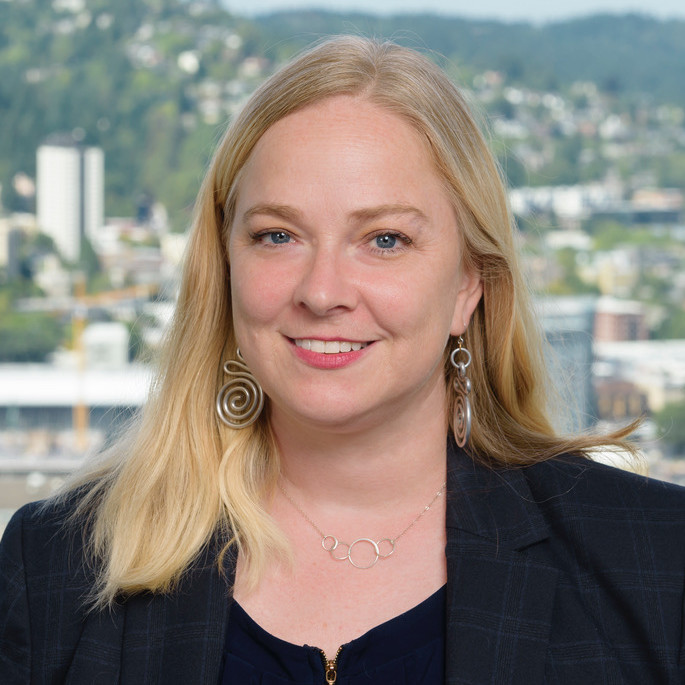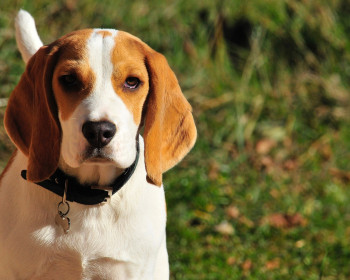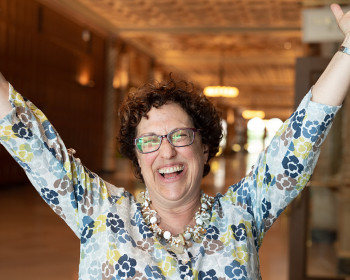Meet Professor Delci Winders
Open gallery

We could not be more excited to welcome dynamo, Delcianna (Delci) Winders, to our team at CALS. We sat down with Professor Winders to talk about all things animal law and her exciting new role at CALS, as we launch the first of its kind law school clinic devoted exclusively to animal law litigation and focused on farmed animals.
Interview:
Q: This opportunity at CALS seems like a perfect fit for you, as it allows you to marry your passions for litigation and teaching. What are you most excited about in your new role?
A: Directing the Animal Law Litigation Clinic is truly a dream come true, and I’m excited about so many aspects of the new role. At the top of the list is bringing cutting edge lawsuits on behalf of farmed animals, whose interests are so often overlooked by our legal system, while simultaneously mentoring new generations of litigators who are going to use their skills to build careers dedicated to improving the lives and status of animals.
Q: Given your incredible resume, you could have gone to work anywhere. Why did you choose to join CALS to launch the first-ever Animal Law Litigation Clinic?
A: CALS is the epicenter of animal law and I can imagine no better place for the ALLC. Unlike any other law school on the planet, thanks to CALS, nearly one third of JD students at Lewis & Clark Law School come here because of their interest in animal law, and the Animal Law LLM Program attracts an incredible array of international leaders. We are truly incubating the future of animal law lawyers. A significant and growing number of Lewis & Clark Law School grads practice animal law, and I want to help ensure that they have the best possible training to develop and litigate cases that will create meaningful change for animals.
Q: You certainly blazed your own trail in finding opportunities to advocate for animals through the legal system. Do you have any advice for our incoming students who share your unbridled enthusiasm for using their law degrees to help animals?
A: Network, network, network! The best possible thing I ever did for my law career was to join the New York City Bar’s animal law committee as a student. Virtually every job I’ve had since has been somehow tied to the connections I made there. Of course, students at Lewis & Clark have the advantage of being at the nation’s leading animal law school, with ample opportunities to engage with practitioners who may well be their future employers and/or colleagues. Don’t take it for granted! At the same time, don’t take on more than you can handle. Our community is still small, and word gets around, so if you take on a project, you want to make sure to do your best work.
Q: The Animal Law Litigation Clinic will focus on issues that benefit farmed animals. Why should people care about farmed animals and how do you envision the Clinic helping them?
A: Farmed animals are the most abused animals on the planet. Locked away out of view, they are routinely subjected to a parade of horrors, including painful mutilations without anesthesia, intensive confinement, forcible insemination, having their babies ripped from them, and violent deaths. They also comprise the vast majority of animals humans interact with, even though those interactions may only be with their flesh. Thus, billions of animals are subjected to unspeakable cruelty every year in this country. Addressing this atrocity is a moral imperative. The Clinic will do so by bringing lawsuits that challenge long standing assumptions that farmed animals are “beyond the law.” We will bring cases where farmed animals’ interests are front and center and will force our legal system to confront egregious abuse that has been tolerated for too long.
Q: In addition to animal protection, the Clinic’s goal is to teach and develop the next generation of animal law attorneys. How will students benefit from the Clinic?
A: The clinic will instill strategic thinking skills that are critical to developing cases on behalf of animals in a system that has historically excluded their interests, as well as the practical skills that are essential to successfully litigating those cases. Hands on experience with their very own cases will give students an unparalleled learning experience.
Q: If you had a magic wand and could change one law that you have litigated in an effort to improve the lives of animals in the U.S., what law would it be and why?
A: There are so many things that need changing in our laws if we are going to truly, meaningfully, and robustly recognize the interests of animals, but if I could change one thing I would start with amending our state cruelty laws to end exemptions for farmed animals and create a private right of action.
Q: What is your proudest accomplishment to date as an animal lawyer?
A: The shuttering of Ringling Bros. was a watershed moment for me in my career as an animal lawyer and for our country more generally in our relationship for animals. One of the very first cases I ever worked on was against Ringling Bros., and I went on to spend many years advocating on behalf of the elephants and other animals exploited by this notorious circus. There wasn’t one single legal victory that sealed the deal, but a series of multi-pronged attacks. Among other things, we used the law to help expose Ringling’s egregious abuse of elephants, we helped secure the largest fine against any animal exhibitor in the history of the Animal Welfare Act, and we worked to pass laws in various jurisdictions to ban traveling elephant acts. In the end, Ringling cited changing public opinion and a shifting legal landscape in announcing its decision to phase out elephants. Since this victory, numerous other circuses have opted to stop using elephants and other wild animals, and some have even gone entirely animal-free, while others have closed down, and laws banning wild animals in circuses are passing at an increasing rate. Just as we’ve seen the law come to reflect shifting public values when it comes to elephants and other wild animals exploited for entertainment, I’d like the Clinic’s work to hasten the day when our law accurately reflects the values that Americans put on the wellbeing of farmed animals.
Q: You have devoted your legal career to animal protection work. How did you first become interested in taking that path?
A: I became an animal advocate when I was about fourteen years old, after two pigs I had bottle-raised were slaughtered, to my shock and dismay. I began checking out all the books I could find at the library about factory farming and animal advocacy, and quickly became vegan and committed to tackling our institutionalized exploitation of animals. I went to law school to better equip me in that fight.
Q: As a trailblazer, you have undoubtedly come across your share of skeptics who think the legal system should be reserved for “more important” endeavors. Why should the legal system consider the interests of animals?
A: Expanding our circle of concern to include animals doesn’t work to the detriment of anyone or any other endeavors. To the contrary, animals’ interests–especially farmed animals’ interests–are deeply intertwined with human interests. Factory farming isn’t just inflicting unspeakable suffering on animals, it’s also seriously harming human workers, the environment, human health, and more.
About Professor Winders: Professor Winders received her JD from N.Y.U. School of Law, where she was awarded the Vanderbilt Medal for outstanding contributions to the law school (based on her work bringing animal law to the school), named as a Robert McKay Scholar, and served as the Senior Notes Editor of the NYU Law Review. She also served as Harvard’s First Animal Law and Policy Fellow. Following law school, Professor Winders clerked for the Honorable Martha Craig Daughtrey on the United States Court of Appeals for the Sixth Circuit. She then practiced animal law for more than a decade in a variety of settings, including private practice as an associate, and later, as Vice President and Deputy General Counsel at the PETA Foundation, where she led a team of lawyers, veterinarians, and scientists to successfully transfer over a hundred individual captive wild animals from appalling conditions to reputable sanctuaries. She has taught Animal Law at the Elisabeth Haub School of Law at Pace University, Loyola University New Orleans College of Law, Tulane University School of Law, and Vermont Law School. She has published animal law scholarship in top-50 law review journals, as well as opinion pieces in National Geographic, Newsweek, New York Daily News, New York Times, USA Today, Wall Street Journal, Washington Post, and numerous other media outlets. Fittingly, Professor Winders was featured in O Magazine as one of “Six Women Who Dare.” We knew that Professor Winders was the perfect fit as CALS dared to launch the first of its kind Animal Law Litigation Clinic this semester!
More Center for Animal Law Studies Stories
Center for Animal Law Studies is located in Wood Hall on the Law Campus.
MSC: 51
email cals@lclark.edu
voice 503-768-6960
Center for Animal Law Studies
Lewis & Clark Law School
10101 S. Terwilliger Boulevard MSC 51
Portland OR 97219

